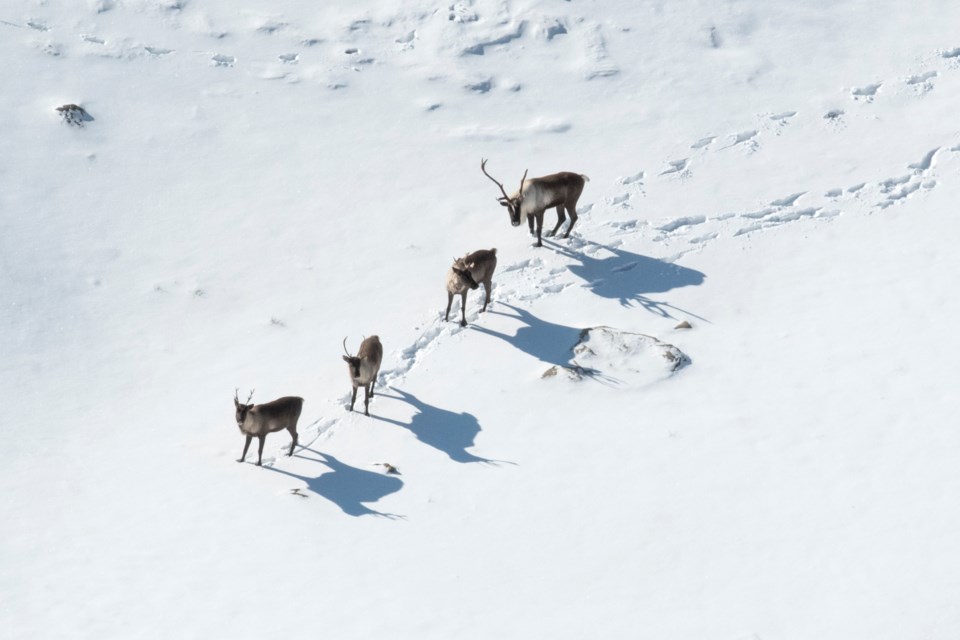Scott Hayes, Local Journalism Initiative Reporter | [email protected]
Three conservation organizations are supporting Parks Canada’s “difficult decision” to buy out two backcountry outfitters in the Tonquin Valley.
Parks Canada finalized its agreements with the two outfitters – Tonquin Valley Adventures and Tonquin Valley Backcountry Lodge – at the end of October.
The decision officially ended their licences of occupation. As part of the deal, Parks Canada purchased all of the infrastructure and non-moveable assets of both operations, and provided helicopter transportation for the removal of the proprietors’ remaining equipment and supplies.
In a joint statement issued last week, the three groups stated they recognized how difficult the decision must have been but that it was done with the best interests of the caribou in mind.
“Alberta Wilderness Association (AWA), CPAWS Northern Alberta Chapter and Yellowstone to Yukon Conservation Initiative (Y2Y) support these steps to improve the survival prospects of Tonquin Valley caribou, which are on the brink of extirpation, and now require emergency measures to recover,” the statement read.
The statement also added their recognition of how this measure works to counter all that has already occurred to bring the Tonquin caribou to the brink.
“A history of poor management decisions in the Park and compromises to competing recreational interests have contributed to the near-extirpated state of the herds. In recent years, it seems the tides have turned, as Parks Canada continues to make evidence-based decisions for the benefit of caribou in Tonquin Valley,” it continued.
“It's a very unfortunate situation, for sure. It must have been a difficult decision because it does mark the end of an era for the lodges in that valley. Our view is they'll continue to play a crucial part in the future of caribou in Tonquin Valley because of that decision they've made there, and we're really grateful for that. It must have been a very difficult decision for the lodge owners and for Parks Canada to come to. It does end up in favour of caribou survival and recovery there,” said Gillian Chow Fraser, boreal program manager with CPAWS.
“We strongly support these measures to reduce recreation and habitat pressures upon the remaining Tonquin caribou population, based upon Parks Canada’s obligations to protect species at risk and ecological integrity,” said Carolyn Campbell, conservation specialist of Alberta Wilderness Association.
“This is a significant step in prioritizing the long-term recovery of the Tonquin caribou herd. By securing and connecting key habitats within and beyond park borders, we can give at-risk mountain caribou and other sensitive wildlife species the space they need to survive and thrive long into the future,” said Dr. Hilary Young, Alberta program director with Y2Y.
In October 2021, these same three groups also joined together to welcome Parks Canada’s decision to close backcountry access for the upcoming 2021/22 snow season. That measure was instituted as a way of preventing predator access into both the Tonquin and Brazeau caribou ranges using trails that would have been packed down.
At the same time, they also praised the Alpine Club of Canada for recognizing the problem and how it could help the caribou even before official measures took effect. It led the charge by voluntarily suspending bookings at its Wates-Gibson Hut in the Tonquin backcountry for the entire winter since the 2020/21 season.
Since the 1960s, caribou numbers have dwindled from the hundreds to approximately 60 throughout Jasper National Park. While the Maligne herd was declared extirpated in 2020, the Tonquin and Brazeau herds are now perilously close to that same fate. The Tonquin herd, the larger of the two, has only nine breeding females left in its population.
Parks Canada’s decision on a conservation breeding program is anticipated to be announced in the coming weeks.
The AWA, CPAWS, and Y2Y all believe that such a costly program would likely only be successful if the caribou have a safe and pristine habitat to occupy once they are released.
Chow Fraser said that it still doesn’t guarantee success, but it does help to return the balance.
“When it comes to a species at risk, when we're talking about an endangered animal that only has 10 breeding females in the herd, you're not looking at strong odds. It's really tragic that we're here. That breeding program is an emergency measure. Now we're seeing losses in recreation opportunities. We're seeing losses of business operations. It's because, again, we're at a place where now this herd is so small, that you have to be making those sacrifices,” she said.
“Honestly, it’s very sad, but it's a lesson. Taking the action now is so much easier than waiting until this species is circling the drain and then you're making all of these last ditch efforts. But it's a national park and the National Parks’ priority is ecological integrity. If you're not going to be pulling out all the stops to save an endangered species in a national park, where else are you going to do that? It has to be the priority. It is the responsibility of Parks Canada to be giving them the best chances to be taking a lot of those actions. I think that it is a ‘fingers crossed’ situation.”
She added that at least people can look back and be proud that these difficult decisions were made to give caribou the best shot at surviving and even becoming a thriving species in Jasper National Park once more.




